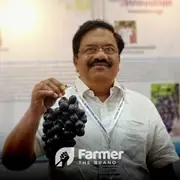
Farmers in India have always come up with new innovations and techniques in making agriculture better day by day and Dattatraya Nanasaheb Kale is one such progressive farmer.
Dattatraya is a grape farmer from Taluka North Solapur, Solapur district, Maharashtra and has been doing farming since many years. His father Nanasaheb Kale was a pioneer in the grape farming, who developed the Sonaka Seedless grapes and Sharad Seedless varieties.
He has followed in his father’s footsteps by developing two new varieties of black grapes named Sarita and Nanasaheb Purple Seedless and, the other a variety of Sonaka called the New Sonaka.
In 1998 he began to noticed a specific mutated clone that grew varieties which were long and pleasantly aesthetic. He grafted the particular clone over rootstock of dog ridge variety of grapes and observed the results for the following three years and thus in 2003 he developed a new variety of grapes which he named after his mother Sarita Kale.

The story of the other grapes was almost identical when he saw a mutated clone of the Sharad Seedless which reached sizes of about 25 to 28 mm. He repeated the same process of grafting and thus he developed a new variety which he named after his father Nanasaheb Kale. This grapes are known to have a distinct litchi flavour while also having a high sugar content and being more pulpy.
Both the varieties are of a high quality and thus are exported to many countries and are also sold domestically.
Both the varieties that he developed are now used by farmers across the states of Maharashtra, Andhra Pradesh, Madhya Pradesh and Karnataka. The Nanasaheb variety is estimated to be grown over an area of 21000 hectares whereas the Sarita variety is grown over an area of 17000 hectares.
The application for registering both these varieties has been started by the National Innovation Foundation.
Dattatraya has not rested on his laurels and has gone ahead and developed one more variety from the Sonaka Seedless in 2016-17 whose size is about 17-18mm and has a long shelf life which makes it suitable for exports. He has also developed a nursery through which he sells the grafts of the seedless varieties and also the raisins.


















Share your comments